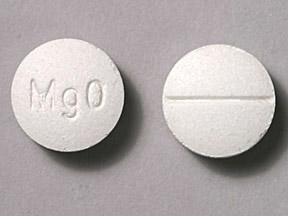
Magnesium Oxide -mg Supplement Coupons & Savings Card – Discount Prices from $3.55
Generic for: Mag-200, Ra magnesium, Sm magnesium oxide
This medication is a mineral supplement used to prevent and treat low amounts of magnesium in the blood. Some brands are also used to treat symptoms of too much stomach acid such as stomach upset, heartburn, and acid indigestion. Magnesium is very important for the normal functioning of cells, nerves, muscles, bones, and the heart. Usually, a well-balanced diet provides normal blood levels of magnesium. However, certain situations cause your body to lose magnesium faster than you can replace it from your diet. These situations include treatment with "water pills" (diuretics such as furosemide, hydrochlorothiazide), a poor diet, alcoholism, or other medical conditions (such as severe diarrhea/vomiting, stomach/intestinal absorption problems, poorly controlled diabetes).
Our coupons are free to use. Before paying, show the pharmacist your Magnesium Oxide -mg Supplement savings card to get your free discount. Use our filters below to edit the prescription box to match your needs. The Magnesium Oxide -mg Supplement prices will update based on your prescription needs. Above our Magnesium Oxide -mg Supplement coupons, you can change your location to see pharmacy prices and costs in other areas. We're here to help you buy Magnesium Oxide -mg Supplement at the lowest price with our prescription discount card.
My prescription
Edit
400 (240 Mg)MG, Magnesium Oxide -mg Supplement (30 Tablets)
Select pharmacy

Walgreens
$3.55
COUPON PRICE
Albertsons
$5.27
COUPON PRICEMagnesium Oxide -mg Supplement savings card
Show this card to your pharmacist
Walgreens
$3.55
BIN
ID
PCN
GRP
019876
LH039DC103
CHIPPO
LHX
Powered by
This medication is a mineral supplement used to prevent and treat low amounts of magnesium in the blood. Some brands are also used to treat symptoms of too much stomach acid such as stomach upset, heartburn, and acid indigestion. Magnesium is very important for the normal functioning of cells, nerves, muscles, bones, and the heart. Usually, a well-balanced diet provides normal blood levels of magnesium. However, certain situations cause your body to lose magnesium faster than you can replace it from your diet. These situations include treatment with "water pills" (diuretics such as furosemide, hydrochlorothiazide), a poor diet, alcoholism, or other medical conditions (such as severe diarrhea/vomiting, stomach/intestinal absorption problems, poorly controlled diabetes).
Our coupons are free to use. Before paying, show the pharmacist your Magnesium Oxide -mg Supplement savings card to get your free discount. Use our filters below to edit the prescription box to match your needs. The Magnesium Oxide -mg Supplement prices will update based on your prescription needs. Above our Magnesium Oxide -mg Supplement coupons, you can change your location to see pharmacy prices and costs in other areas. We're here to help you buy Magnesium Oxide -mg Supplement at the lowest price with our prescription discount card.
